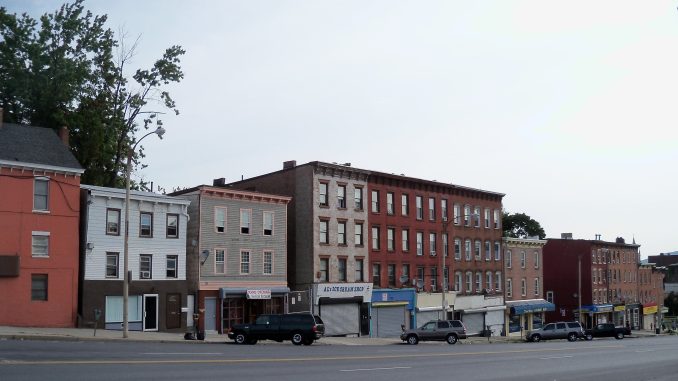
On Oct. 17, John Jay College sociology professor Richard E. Ocejo led an open discussion in the Coykendall Science Building (CSB) auditorium on his book, “Sixty Miles Upriver: Gentrification and Race in a Small American City.” Hosted by the Benjamin Center for Public Initiatives and the Department of Sociology, the event attracted a crowd of around 20 people.
Ocejo released “Sixty Miles Upriver” on April 24, and it covers gentrification in Newburgh. It also touches on the moral issues behind white gentrification, and the consequences it has on the city’s majority Black population.
House affordability has been getting worse in the Hudson Valley, generally due to rising rents outpacing tenants’ stagnant wages. Gentrification has affected many areas of the Hudson Valley, and Newburgh has experienced this issue rapidly in recent years.
Newburgh being a gentrification site is abnormal given the city’s small size and its population of approximately 30,000 people. Generally, the issue occurs in much larger cities, but housing in Newburgh is cheaper compared to prices in surrounding Hudson Valley areas. As a result, gentrifiers move to Newburgh and have a higher chance of making a profit there.
As a sociology professor, Ocejo was particularly interested in exploring the “moral dilemma” gentrifiers face in Newburgh. In his book, Ocejo refers to this conflict as the “moral frame of opportunity.” Gentrifiers wish to urbanize Newburgh and foster new opportunities in the area, but they also threaten to displace long-time residents.
Ocejo began researching for his book in February 2017 and concluded his interviews with the city’s residents in April 2021. During the discussion, Ocejo said he would put an asterisk on his research being completed years after he began because of how dramatically the pandemic affected his ability to conduct interviews and visit Newburgh. Throughout the four-year research period, Ocejo interviewed 144 people. Half the people he interviewed were gentrifier stakeholders and white newcomers. The other half of Ocejo’s interviews consisted of Black and immigrant residents from Newburgh.
Racial discourse is a huge component of “Sixty Miles Upriver.” Newburgh is a predominantly Black region with many Hispanic residents as well. A majority of the city’s gentrifiers are white.
In one part of his discussion, Ocejo talked about a building owner who, like many gentrifiers, previously lived in New York City. The man told Ocejo he wanted to open an art shop, but never did because he knew his business would be too expensive for the general Newburgh population. Another gentrifier told Ocejo that “[Newburgh] doesn’t need low-income housing,” and he wished people with higher incomes would rent out his property.
In the early 2010s, Newburgh became synonymous with violent crime. In 2011, Newburgh was named the “murder capital of New York” by New York Magazine. The year prior, an article published by The New York Times proclaimed that “drug-fueled violence” ran rampant as gang activity caused over a dozen homicides in the preceding years.
Before white gentrifiers migrated to Newburgh, the city was a deindustrialized urban city with among the highest poverty rates in New York. In the Official Poverty Measure’s 2021 report, 13.9% of New York state residents lived under the poverty line. In 2022, Newburgh reported a poverty rate of 26.5% — nearly double New York’s average.
Homelessness has increased in Newburgh as gentrifiers have bought out homes and raised rents for tenants. According to a U.S. Department of Housing and Urban Development survey, there are 776 unhoused people in Orange County, including those from Newburgh.
“I grew up in the area, so I’ve known [of] Newburgh,” said SUNY New Paltz alumnus Carolyn Weinstein. “Anything that comes out of Newburgh is always kind of like with a scoff.”
Weinstein added she has a lot of friends who live in Newburgh, and she is worried about them because of the city’s rising prices. “There’s just so many problems,” Weinstein continued.
During the Q&A section of Ocejo’s discussion, several attendees discussed how they have witnessed gentrification spreading across the Hudson Valley. Rennie Scott-Childress, who serves as the alderman for Ward 3 in Kingston, said “a lot of times in Kingston, [the city’s council] had people come up to talk about gentrification.” Kingston is also a small city of just over 24,000 people, which means big-city solutions for gentrification are inapplicable.
Another audience member said he moved to Newburgh because he was priced out of other cities and wished to live on the same side of the bridge as New Paltz. Ocejo said he interviewed several people in the same situation; they were priced out in Beacon, so they moved to Newburgh instead.
One questioner asked Ocejo if Newburgh’s political affiliation has shifted as gentrification worsens in the city. Ocejo responded that Newburgh’s residents remain generally progressive but possess more conservative views regarding efforts to revitalize the city.
Many long-term residents have resisted gentrification and believe gentrifiers’ claims of creating “opportunity” within Newburgh are superficial. Veteran tenants want Newburgh to undergo urban development but believe none of the new housing would help them in any meaningful way.
Ocejo ended by saying he would be interested in exploring other Hudson Valley regions dealing with gentrification, but for now he is on a break. He was fascinated by the NoVo Foundation in Kingston, which has “provided general operating support to long-standing nonprofit agencies.”
NoVo in Kingston looks to complete major capital projects in the city like The Metro. The facility plans to offer training and career opportunities to Kingston’s younger demographics and provide work areas for entrepreneurs and small businesses.
Ocejo is also the author of “Masters of Craft: Old Jobs in the New Urban Economy” and “Upscaling Downtown: From Bowery Saloons to Cocktail Bars in New York City.” All three of Ocejo’s works have been published by Princeton University Press.


Leave a Reply
You must be logged in to post a comment.